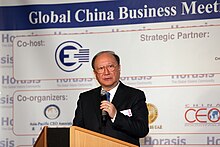Xu Kuangdi
Xu Kuangdi | |
|---|---|
| 徐匡迪 | |
 | |
| Mayor of Shanghai | |
| In office February 1995 – December 2001 | |
| Preceded by | Huang Ju |
| Succeeded by | Chen Liangyu |
| Personal details | |
| Born | December 1937 (age 86–87) Tongxiang, Zhejiang, China |
| Political party | Chinese Communist Party |
Xu Kuangdi (Chinese: 徐匡迪; pinyin: Xú Kuāngdí; born December 1937) is a Chinese politician and scientist, best known for his term as Mayor of Shanghai from 1995 to 2001. He supervised the transformation of Shanghai during his administration into a center for international investment and trade that helped lead the intensive development of China's economy. Between 2003 and 2008, Xu served as Vice-Chairman of the Chinese People's Political Consultative Conference.
Biography
[edit]Xu was born in Tongxiang, Zhejiang province, near Shanghai. He graduated from Hangzhou High School. He graduated from the Beijing Institute of Iron and Steel Engineering in 1959, during the midst of the Great Leap Forward, and was a professor there from 1959 to 1963, then at the Shanghai Institute of Engineering from 1963 to 1971, through the height of the Cultural Revolution. He did not join the Chinese Communist Party until 1983. He studied in Britain in 1982 and 1983 and worked in Sweden from 1984 to 1985; he also won a national award for his design of a stainless steel pipe for use in aircraft production.
He held a number of other academic positions through 1991, when Zhu appointed him as director of the Shanghai Municipal Planning Commission, allegedly because he had remarked that he hated central planning.
Xu was Mayor of Shanghai from 1995-2001.[1]: 146 During his tenure, Shanghai's Pudong New Area developed rapidly.[1]: 146
However, Xu was demoted in 2001, to a far more obscure position as party chief of the Academy of Engineering in Beijing, apparently as the result of an internal party power struggles. Xu was replaced by Executive Vice-Mayor Chen Liangyu, one of Jiang's associates who was later convicted on charges of corruption.
From 2003 to 2008 Xu was a Vice-Chairman of the Chinese People's Political Consultative Conference.[2] He is a professor and doctoral supervisor at Shanghai University.
He retired on June 11, 2010 from his post as the Party Chief and President of the Chinese Academy of Engineering.[citation needed]
In 2014, he was appointed to lead the advisory panel for the coordinated development of the Beijing-Tianjin-Hebei region.[1]: 146 Xu is Xi Xinping's lead advisor on the development of Xiong'an, as of at least 2023.[1]: 146
Xu was an alternate member of the 14th Central Committee of the Chinese Communist Party and a full member of the 15th and 16th Central Committees.[citation needed]
Honours
[edit]In 2004 Xu was elected as an International Fellow[3] of the UK Royal Academy of Engineering.[4]
On June 28, 2011, Xu received an honorary Doctor of Engineering degree from the City University of Hong Kong.[5]
References
[edit]- ^ a b c d Hu, Richard (2023). Reinventing the Chinese City. New York: Columbia University Press. ISBN 978-0-231-21101-7.
- ^ CPPCC holds meeting to discuss preparations for upcoming session Xinhua, February 29, 2008
- ^ "List of Fellows".
- ^ "List of Fellows".
- ^ "CityU NewsCentre - CityU to confer honorary doctoral degrees on four distinguished persons". wikisites.cityu.edu.hk. Archived from the original on 2011-07-01.
- 1937 births
- Living people
- 20th-century mayors of places in China
- 21st-century mayors of places in China
- Hangzhou High School alumni
- Mayors of Shanghai
- Chinese metallurgists
- Members of the Chinese Academy of Engineering
- Politicians from Jiaxing
- People's Republic of China politicians from Zhejiang
- Chinese Communist Party politicians from Zhejiang
- Vice Chairpersons of the National Committee of the Chinese People's Political Consultative Conference
- Commanders Grand Cross of the Order of the Polar Star
- Foreign associates of the National Academy of Engineering
